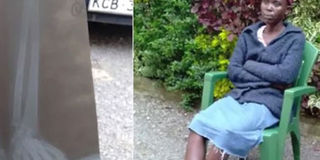Doctors find 10 sewing needles in woman’s body

Ms Tabitha Wairimu shows an X-ray scan that revealed she had sewing needles lodged in her body. PHOTO | NYABOGA KIAGE | NATION MEDIA GROUP
What you need to know:
- Ms Tabitha Wairimu could not explain how the foreign objects ended up in her body or even for how long they have been there.
As many as 10 sewing needles have been found lodged in the body of a 29-year-old woman, doctors said on Friday.
Ms Tabitha Wairimu could not explain how the foreign objects ended up in her body or even for how long they have been there.
An X-ray scan revealed the needles are lodged in her chest, both hands and abdoment.
Ms Wairimu's friends said they had started to worry about her, describing her as “totally changed after years of disappearance.”
They say Wairimu returned from where she was with acute memory lapse and speech impairment.
Speaking to the Nation, Ms Wairimu talked of being raped, abused and left to die in Mlolongo, Nairobi.
She does not recall when the incidents happened, but can remember bloody scenes after the incidents.
Ms Wairimu complains of strong pain in her lower abdomen where one of the needles is lodged.
“I feel nothing on other parts of the body apart from my stomach where the pain is [too] much to bear,” she said.
According to her, she grew up under the care of a step-mother before she started living on the streets.
Ms Wairimu does not know her parents and the close she has come to a relative in the recent past is when she married a man whose whereabouts she doesn't know.
“But it is long since I heard from him. Whenever I ask his friends [of his whereabouts] they tell me he went to Tanzania,” she said.
An active member in a Dandora church in Nairobi, Ms Wairimu had her friends worried as they feared she had gone mad.
But following an X-ray scan, it was revealed she had sewing needles lodged in her hands, abdomen and chest.
“The patient cannot explain how the needles ended in her body but we shall work round the clock to help her survive,” said Dr Peter Gichangi.





